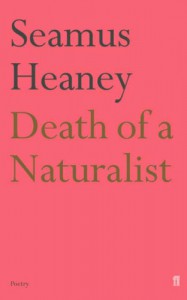Currently reading
How the World Works
The English Auden: Poems, Essays and Dramatic Writings, 1927-1939
Auden Generation: Literature and Politics in England in the 1930's
Collected Poems
Death of a Naturalist
 I opened this book without much introduction, hoping to investigate the poems at least initially without a guide, and in fact I did not find any of them obscure or difficult to read; they are accessible and thoroughly enjoyable. ‘Digging’, the first poem in Heaney’s first published book of poems, is a powerful opening to a brilliant career. This first collection of 34 poems is generally of the highest quality, which is awe inspiring.
I opened this book without much introduction, hoping to investigate the poems at least initially without a guide, and in fact I did not find any of them obscure or difficult to read; they are accessible and thoroughly enjoyable. ‘Digging’, the first poem in Heaney’s first published book of poems, is a powerful opening to a brilliant career. This first collection of 34 poems is generally of the highest quality, which is awe inspiring. But I could not shake expectations shaped by a month spent reading Ted Hughes and the knowledge that Heaney is said to have found his own voice after reading Hughes. For better or worse, I found myself reading these poems with Ted Hughes in mind.
Both poets recall childhoods shaped by the natural world, both write of this in very direct, visual terms, both delight in finding evocative, highly original images. In Heaney, the waters tip over a waterfall “like villains dropped screaming to justice;” Aran island rushes “To throw wide arms of rock around a tide / That yielded with an ebb,...” Ted Hughes has many brilliant images to his credit; when I read either him or Heaney my immediate response is to be intimidated. For Heaney, by contrast, there is no question of his ability to rise to the challenge.
Both can be wholly unromantic about country life, with scant respect for the tender sensibilities of town folk. Both write with delight about hunting and fishing. Heaney writes as the favoured son of a farming family, managing the land for their living.
‘Prevention of cruelty’ talks cut ice in the town
Where they consider death unnatural,
But on well run farms pests have to be kept down.
[The Early Purges]
Ted Hughes writes as the working class poacher, trespassing on land that has been enclosed by its wealthy owners:
I saw
Country poverty raising a penny,
Filling a Sunday stewpot. You saw baby-eyed
Strangled innocents. I saw sacred
Ancient custom. ...
... my heritage, hard won concessions
From the hangings and the transportations
To live off the land.
[The Rabbit Catcher]
Heaney’s is not the voice of landed privilege, but he refers in his poems to a different oppressive heritage, evoking the 19th century potato famines in ‘At A Potato Digging’, and pointing the finger of blame in ‘For the Commander of the Eliza’:
Sir James, I understand, urged free relief,
For famine victims in the Westport Sector
And earned tart reprimand from good Whitehall.
Let natives prosper by their own exertions;
Who could not swim might go ahead and sink.
Interesting that Ted Hughes made peace with the landowners, not least their possession of fishing rights on the best rivers, and enjoyed becoming Poet Laureate, socialising with the royal family, while for the nationalist Heaney such compromise was never in prospect, even though he was shortlisted for the post of laureate in 1999. The horrible “Westminster” values described above in Heaney’s poem on the famine were of course revived by Thatcher, whom Ted Hughes admired.
Included in this collection are some intimate poems referring to Heaney’s marriage, in a very personal tone which is nevertheless somewhat conventional and light; Ted Hughes was far more passionate, reflected in his work on the poetry of Sylvia Plath while she lived and after as well as in his own personal poetry, especially in his Birthday Letters, though he published such private material reluctantly and late.
It is arguably an odd thing to base a review on such a comparison, especially as I seem to be comparing the entire collected work of Ted Hughes with Heaney’s very first publication. In fact, I am already turning over fresh alignments in Heaney's next volume. However, my reviews are always just my personal response to reading any book, and this was it. [Oh, and I notice that on this page Jayaprakash Satyamurthy has built his review on a comparison with Walcott.]







